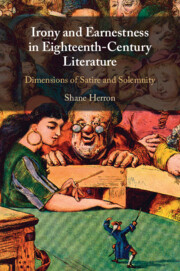Refine search
Actions for selected content:
4 results
7 - Kierkegaard and the Indefinability and Inexplicability of Death
-
- Book:
- A History of Nihilism in the Nineteenth Century
- Published online:
- 10 March 2023
- Print publication:
- 30 March 2023, pp 201-236
-
- Chapter
- Export citation
Chapter 1 - Swift and the Hacks
-
- Book:
- Irony and Earnestness in Eighteenth-Century Literature
- Published online:
- 19 January 2022
- Print publication:
- 27 January 2022, pp 18-53
-
- Chapter
- Export citation
Epilogue - Earnest Satire, Cynical Credulity, and the Task of Irony
-
- Book:
- Irony and Earnestness in Eighteenth-Century Literature
- Published online:
- 19 January 2022
- Print publication:
- 27 January 2022, pp 184-189
-
- Chapter
- Export citation

Irony and Earnestness in Eighteenth-Century Literature
- Dimensions of Satire and Solemnity
-
- Published online:
- 19 January 2022
- Print publication:
- 27 January 2022
